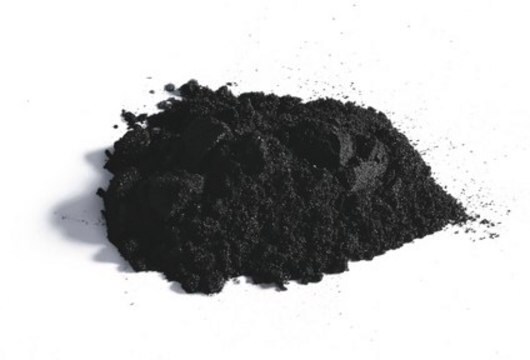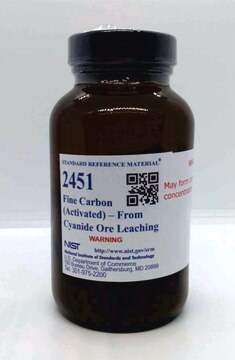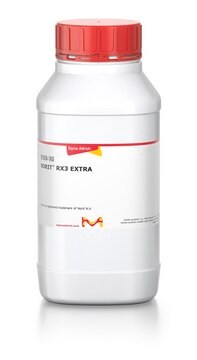31616
Activated Charcoal Carbon Adsorbent
puriss. p.a., powder
Synonym(s):
Charcoal activated
About This Item
Recommended Products
Product Name
Activated charcoal, puriss. p.a., powder
vapor pressure
<0.1 mmHg ( 20 °C)
Quality Level
description
methylene blue-adsorption 12 mL
grade
puriss. p.a.
form
powder
autoignition temp.
842 °F
greener alternative product characteristics
Design for Energy Efficiency
Learn more about the Principles of Green Chemistry.
sustainability
Greener Alternative Product
resistivity
1375 μΩ-cm, 20°C (graphite)
technique(s)
LPLC: suitable
tissue culture: suitable
impurities
≤0.003% heavy metals (as Pb)
≤0.5% in water soluble matter
≤1% soluble in acid
ign. residue
≤2%
loss
≤8% loss on drying, 120 °C
matrix
Carbon
matrix active group
carbon
pH
6-9
mp
3550 °C (lit.)
anion traces
chloride (Cl-): ≤100 mg/kg
sulfate (SO42-): ≤100 mg/kg
cation traces
Cu: ≤25 mg/kg
Fe: ≤300 mg/kg
Pb: ≤10 mg/kg
Zn: ≤10 mg/kg
greener alternative category
separation technique
reversed phase
SMILES string
[C]
InChI
1S/C
InChI key
OKTJSMMVPCPJKN-UHFFFAOYSA-N
Looking for similar products? Visit Product Comparison Guide
General description
Application
- to study its effect on tissue cultures of Daucus carota, Happlopapus gracilis and Allum cepa var. proliferum, to check the adsorption of metabolites inhibiting morphognesis.
- It may be used as the primary gastrointestinal decontamination procedure after acute drug overdose.
- It may also be used for the adsorption of dyes namely malachite green, bromophenol blue, alizarine red-S, methylene blue, eriochrome black-T, phenol red, methyl blue, and methyl violet from aqueous media.
- Oral activated charcoal may be also used for adsorption of theophylline, hence can be effectively used in patients with theophylline poisoning.
Storage Class Code
11 - Combustible Solids
WGK
WGK 3
Flash Point(F)
Not applicable
Flash Point(C)
Not applicable
Personal Protective Equipment
Choose from one of the most recent versions:
Already Own This Product?
Find documentation for the products that you have recently purchased in the Document Library.
Customers Also Viewed
Our team of scientists has experience in all areas of research including Life Science, Material Science, Chemical Synthesis, Chromatography, Analytical and many others.
Contact Technical Service





